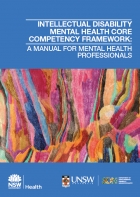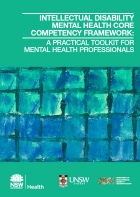What is the Framework Manual?
The Intellectual Disability Mental Health Core Competency Framework: A Manual for Mental Health Professionals describes the specific skills and attributes required by mental health professionals for the provision of quality services to people with an intellectual disability. It outlines the necessary approaches to clinical practice when working with people with an intellectual disability and identifies the core competencies that mental health professionals require to work in this area. The Framework also includes a self-assessment tool to help professionals determine their current skill set and guides readers to resources that support professional development in intellectual disability mental health.
The Framework was developed in consultation with key stakeholders, and was funded by Mental Health-Children and Young People, NSW Ministry of Health.
Click here to download the Framework Manual.
What is the Framework Toolkit?
The Intellectual Disability Mental Health Core Competency Framework: A Practical Toolkit for Mental Health Professionals has been developed to accompany the Framework Manual. It provides practical information, assessment tools and links to resources to assist in the development of the core attributes described in the Framework Manual. The mental health workforce can use the resources to continue to support their professional development in the area of intellectual disability mental health. A section also outlines how service managers can help to implement the Framework and Toolkit in their mainstream mental health services.
Click here to download the Framework Toolkit.
Who is the Framework Manual and Toolkit for?
The Framework Manual and Toolkit have been developed for mainstream mental health professionals. They are beneficial for professionals who provide mental health services within hospitals, government and non-government community services, and private practices. The Manual and Toolkit are also useful for people who work in service management, service development, education of mental health professionals and quality improvement.
Aims of the Framework Manual and Toolkit
By supporting professionals within mainstream mental health services to develop core competencies in intellectual disability mental health, the Framework Manual and Toolkit aims to:
- increase the capacity of mental health services to meet the needs of people with an intellectual disability,
- ensure the provision of high quality mental health assessment and treatment to people with an intellectual disability, and
- increase access to services and reduce service barriers for people with an intellectual disability.
How to use the Framework Manual and Toolkit
Mental health professionals can use these documents to:
- make reasonable adjustments to clinical practice to assist in better assessment and management of mental health problems in people with an intellectual disability
- assist in undertaking a self-assessment of current skills and knowledge
- inform a professional development plan, or
- guide you to available relevant resources, education, training materials and assessment tools.
Service managers, service developers and people responsible for quality improvement could use the Framework documents:
- to review current capacity of services and workforce in the area of intellectual disability mental health,
- for the professional development of staff,
- to inform education and training plans, and
- to guide recruitment of appropriately skilled mental health professionals.


